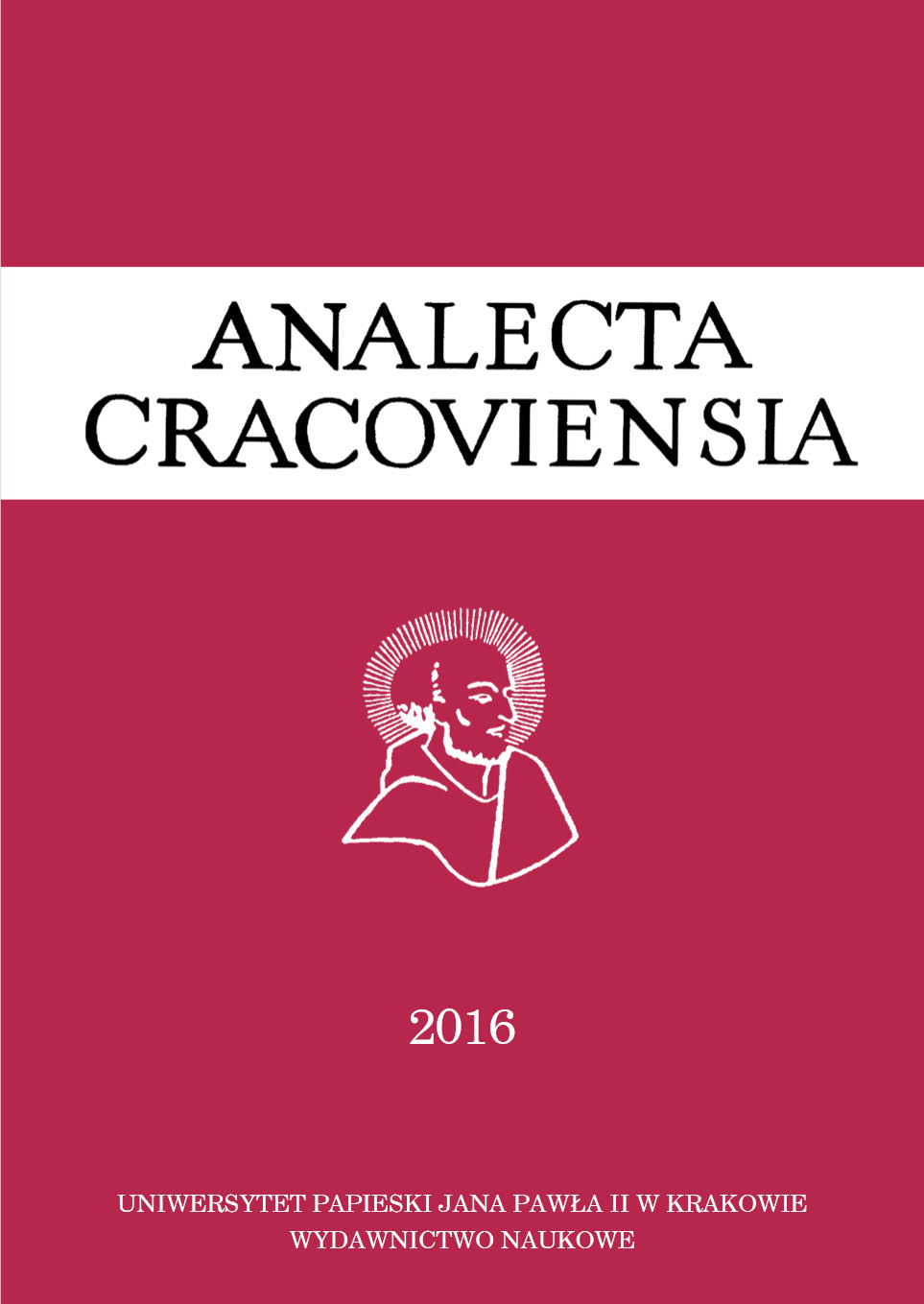The works of mercy toward the body and soul. History and practice
DOI:
https://doi.org/10.15633/acr.2017Keywords:
divine mercy, mercy to the poor, alms, catechism, charity parochial, St. Faustina, St. John Paul II, Pope FrancisAbstract
The Church made assisting the poor and needy an important part of its mission, as a response to an explicit command to enact the commandment to love one’s neighbor given by Christ. The obligation to show an active love of neighbor is expressed in the catechism formula of works of mercy toward the body and soul. The article analyzes both the genesis of this formula, as well as its historical interpretation over the centuries.The corporal works of mercy have been clearly stated by Christ Himself in the context of the teaching of the last judgment recorded in the Gospel of Matthew 25:31–40, however the spiritual works of mercy find their biblical justification in different places of the Gospels. In III century Origen in the spirit of allegorical exegesis interpreted the works of mercy mentioned in the Gospel of Matthew also as a call to help in the spiritual needs of man, and after him St. Augustine in the West. In this way, gradually the list of seven works of mercy concerning the soul was established.
St. Thomas Aquinas gave us the classical moral interpretation of the acts of mercy, establishing the conditions under which they are a strict moral obligation. I the later period in the practice of charity stressed the elements such as: a personal experience of God’s mercy as a call to help others (St. Faustina), valuing man in his dignity (St. John Paul II) and recentely a concern for people excluded or deprived of opportunities of self-development (Pope Francis).
References
Źródła
Benedykt XVI, Encyklika Deus caritas est (25 grudnia 2005).
Franciszek, Adhortacja Evangelii gaudium (24 listopada 2013).
Franciszek, Bulla Misericordiae vultus (11 kwietnia 2015).
Franciszek, Encyklika Laudato si’ (24 maja 2015).
Jan Paweł II, Dar Boży dla naszych czasów, homilia na mszy kanonizacyjnej bł. Faustyny Kowalskiej (30 kwietnia 2000).
Jan Paweł II, Encyklika Dives in misericordia (30 listopada 1980).
Jan Paweł II, Orędzie na Wielki Post 1983.
Jan Paweł II, Orędzie na Wielki Post 1984.
Jan Paweł II, Przekroczyć próg nadziei, Lublin 1994.
Pius XI, Encyklika Quadragesimo anno (15 maja 1931).
Literatura
Bądźcie miłosierni jak Ojciec wasz jest miłosierny (Łk 6, 36), red. T. M. Dąbek, Kraków 2002.
Degórski B., Uczynki miłosierdzia w świetle starożytnych reguł mniszych, „Vox Patrum” 1996, z. 30–31, s. 259–274.
Kowalska F., Dzienniczek, Kraków–Stockbridge–Rzym 1981.
Noldin H., Summa theologiæ moralis, vol. 2: De præceptis, Insbruck 1955.
Noye I., Miséricorde, [w:] Dictionnaire de spiritualité, vol. 10, part. 2, kol. 1328–1349.
Ryłko T., Bogaci w miłosierdzie, Kraków 1995.
Sobkowiak J. A., Nowe uczynki miłosierdzia, [w:] Abyśmy się stali synami Bożymi, Warszawa 2011, s. 217–232.
Strzeszewski C., „Bona superflua” w etyce społecznej św. Tomasza z Akwinu, „Roczniki Filozoficzne” 8 (1960) z. 2, s. 53–59.
Szkoła miłosierdzia świętej Faustyny i Jana Pawła II, red. F. Ślusarczyk, Kraków 2008.
Tomasz z Akwinu, Summa theologiæ.
Wejman H., Personalistyczna koncepcja miłosierdzia, „Teologia i moralność” 2 (2007), s. 210–211.
Zulehner P. M., Bóg jest większy od naszego serca. Teologia i duszpasterstwo miłosierdzia, Kraków 2010.
Downloads
Published
Issue
Section
License
The author declares that he owns the copyright to the work (article) and that it is not limited in the scope covered by the above declaration and that the work (article) is an original work and does not infringe the copyright of other persons.
The author allows the Pontifical University of John Paul II in Krakow to use the paper free of charge, non-exclusive and unlimited in time by, i.e.:
– keeping in records and reproduction of the copies of the work using printing, reprography, magnetic recording and digital technology;
– trade in the original or copies on which the work has been recorded (introduction to the market, lending or rental of the original or copies, public exhibition, display, as well as making the work available to the public in such a way that everyone can have access to it in a place and at a time chosen by them);
– inclusion of the work in a collective work;
– granting by the Pontifical University of John Paul II in Krakow a Creative Commons Sub-licence Authorship Recognition-Non-commercial Use-No Subsidiaries 3.0 Poland
The Pontifical University of John Paul II in Krakow makes the work available on the Magazine Platform of the university under the Creative Commons Attribution-Non-commercial Use-No Subsidiary Works 3.0 Poland license.
Thus, it entitles all interested parties to use the work under the following conditions:
- the author and the title of the work will be given,
- the place of publication (journal title and internet address of the originally published work) will be indicated,
- the work will be distributed in a non-commercial manner,
- no dependent works will be created.

